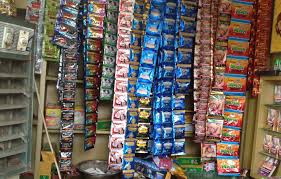Delhi HC sets aside single judge’s order quashing notifications prohibiting manufacture & sale of Gutka, Pan Masala

Upholding the validity of the notification the court set aside a single judge’s order wherein it quashed notification of the Food Safety Commissioner prohibiting the manufacture, storage, distribution, or sale of Gutka, Pan Masala, flavored/scented tobacco, Kharra, and similar products in the interest of public health for one year throughout the National Capital Territory (NCT) of Delhi.
The Delhi High Court on Monday set aside a single judge’s order whereby the judge had quashed the notification of the Food Safety Commissioner prohibiting the manufacture, storage, distribution, or sale of Gutka, Pan Masala, flavored/scented tobacco, Kharra, and similar products in the interest of public health for one year throughout the National Capital Territory (NCT) of Delhi.
Allowing the appeals filed by the Delhi government and the Union of India, a division bench of Chief Justice Satish Chandra Sharma and Justice Yashwant Varma upheld the validity of the notifications.
The division bench held that even though the Cigarettes and Other Tobacco Products Act (COTPA) adopts measures to control smoking and using tobacco products in public areas, near educational institutions, and in general, as well as the type of written and visual warnings required to be displayed on packages, its provisions do not completely control or regulate every aspect of those scheduled products.
It stated that the language and the scope of each section of COTPA should ultimately be used to determine the extent of the regulation and the aspects that are governed and no statute can be construed or understood as legislating upon a subject or conferring a right which is neither spoken of nor engraved therein.
Examining in light of the aforementioned principles, the court stated that it is clear that, despite the fact that the COTPA's individual provisions regulate and control the scheduled products that fall under its purview, it would be completely incorrect to interpret the aforementioned enactment as constituting an all-encompassing and comprehensive piece of legislation.
“The learned Single Judge while dealing with the question of a perceived conflict between COTPA and Food Safety and Standards Act (FSSA) clearly appears to have trodden down an incorrect path while holding that FSSA constitutes a general legislation and therefore must yield to COTPA”, the court said in its 176-page long order.
“As would be manifest from a reading of the Impugned Notifications what was sought to be regulated and controlled was chewing tobacco, gutka and pan masala and tobacco sold as a mixture or in a combination package. The question which thus principally arose was whether the aforesaid articles could be termed as food and thus regulated under FSSA. Rather than conferring attention and restricting its unerring scrutiny on the aforesaid aspect, the learned Single Judge appears to have comprehended the principal question to be whether tobacco could be labelled as food”, it added.
The court said that as per Section 3(1)(j) of FSSA, pan masala, tobacco, or gutka will be included in the definition of food. The provision defines food as “any article used as food or drink for human consumption”.
“We thus find no justification to hold that pan masala, gutka or any other form of chewing tobacco which is meant for human consumption would stand excluded from the ambit of Section 3(1)(j)”, the court held.
The court stated that Article 14 cannot possibly be invoked on the ground that since a particular genre of tobacco has not been banned, there should be no prohibition in respect of an equally harmful article. “In any case, Article 14 does not contemplate of a negative equality. It is, as has been repeatedly held, a positive constitutional right. The guarantee and protection conferred by that Article cannot be invoked to assert a right to manufacture, sell or distribute a harmful substance merely because the appellant has failed to take identical steps in respect of an equally injurious article”, it added.
Conclusively, the court held, “In light of the aforesaid principles, we are of the firm opinion that there existed no justification for the Impugned Notifications being quashed on grounds which have found acceptance with the learned Judge. In any case, Article 14 clearly did not warrant the Impugned Notifications being set aside.”
Single-Judge's Order
In October 2022, the bench of Justice Gaurang Kanth held that the notification by Food Safety Commissioner exceeded its power and authority in contravention of the powers vested in him under the Food Safety and Standards Authority of India (FSSAI).
The single-judge stated that it is aware of the harmful effects and diseases caused by tobacco use, both smokeless and smoking and believes that tobacco, in any form, not just smokeless but also smoking, is harmful to public health, and thus condemns and discourages the use of any form of tobacco.
Court was hearing a batch of petitions filed by companies engaged in the lawful manufacture, trade, distribution, and sale of scheduled tobacco products, particularly flavored and scented chewing tobacco for several decades, challenging notifications issued by the Delhi government’s Food Security Commissioner that prohibited the manufacture, storage, distribution, or sale of gutka, pan masala, flavored/scented tobacco, Kharra, and similar products for one year throughout the NCT of Delhi in the interest of public health.
Case Title: COMMISSIONER (FOOD SAFETY), GNCTD v. SUGANDHI SNUFF KING PVT. LTD. AND ORS. (another connected matter)
Statue: Cigarettes and Other Tobacco Products (Prohibition of Advertisement and Regulation of Trade and Commerce, Production, Supply and Distribution) Act, 2003; Food Safety and Standards Act, 2006; The Constitution of India
